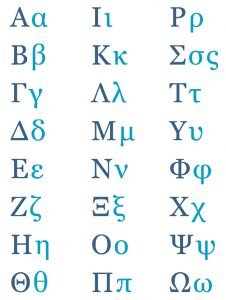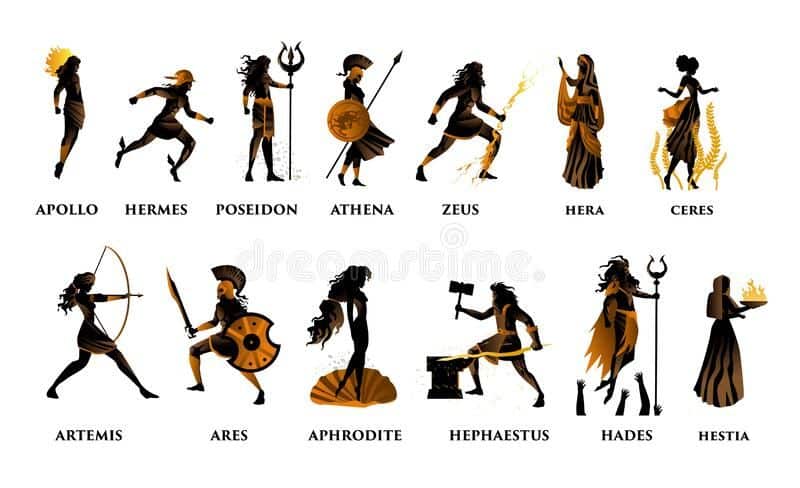Greek has been spoken in the Balkan peninsula since around the third millennium BC, this makes Greek the world’s oldest living language. As you may know Greek isn’t on the list of easiest languages to learn for English speakers. But that doesn’t mean it’s impossible, with dedication and daily practice you’ll be able to learn and master the Greek language.
If you’re looking to start learning Greek, and you’re wondering, “Is Greek Hard to Learn?” Fear not, because in this article we’ll look at both, the aspects that make Greek hard, and those that make it easy to learn. So stay tuned to find out all about the Greek language, and how to learn it.
Table of Contents
Why is Greek Hard to Learn?
Greek is a relatively difficult language to master, even more so for English speakers. But it’s still easier to learn than Russian or Arabic. The reason many English speakers find Greek to be so difficult is that it’s not closely related to the English language. Greek grammar has unusual features, a foreign alphabet, and sometimes tricky pronunciation.
1. Greek is a “Category 3” Language
According to the FDI, Greek is ranked as a category 3 language. This means that it falls under “Hard Languages” that have significant linguistic or cultural differences from English. This makes it a difficult language for English speakers to learn and master. The estimated time it takes to learn Greek is 44 weeks (1100 hours). On the bright side, Greek is easier to learn than east Asian languages like, Chinese, Japanese and Korean, which are category 4 languages. So don’t give up hope, stay dedicated and keep working hard to achieve your goal to learn Greek.
2. Greek Grammar
a. Sentence Structure
Source: AutoLingual
Greek grammar is quite different from the romance and Germanic languages are spoken in Europe, but it’s not as complicated as Arabic or Slavic languages. Greek sentence structure mostly follows the subject-verb-object pattern, as in English. But the thing that makes Greek grammar tricky is that it’s also possible, because of the Greek case system, to change the word order, without losing the meaning of the sentence. This takes some getting used to.
The four cases in modern Greek change the ending of nouns depending on the function of the sentence. This means that the information, conveying the meaning of the sentence is in the noun, and not the word order. This allows a bit more freedom in Greek sentence structure.
Let’s take a look at the four cases in Greek, and sentence examples for each:
- Nominative Case -The nominative case relates to the subject of sentences. Nominative nouns can be put almost anywhere in a sentence. When a nominative noun is the subject of the sentence, it’s usually put after an action verb. and a nominative pronoun will be placed in front of the verb.
Example: **Ο Νίκος αγοράζει μήλα. | Nikos buys apples. (The nominative noun is in bold)
- Genitive Case – Genitive case denotes possession. The genitive case is used much like the English words “my”, “his”, “hers”, and “yours”. A genitive often follows after the noun it qualifies. A noun, pronoun, or adjective in the genitive case is used as a possessive form or the object of a preposition.
Example: Το αυτοκίνητο του Νίκου. | Niko’s car. (The genitive noun is in bold)
- Accusative Case – A noun, pronoun, or adjective in the accusative case is mostly used as a direct object or the object of a preposition. The accusative case is the most common as it is the most general.
Example: Ο Νίκος γνωρίζει τον Κώστα. | Nikos knows Costa. (Accusative noun is in bold)
- Vocative Case – This case is used for direct address, such as when you’re talking to someone. The noun is grammatically independent of the rest of the sentence.
Example: Νίκο! | Nico!
b. Gendered nouns
Source: GreekPod101
In Greek, there are three genders: masculine, feminine, and neuter. Each noun in Greek has a specific gender. These genders don’t exclusively apply to nouns referring to people, they apply to nouns referring to animals and things too. Gender should therefore be seen as a grammatical attribute to a noun, and not as the sex of people, animals, or things.
Guessing or recognizing the gender of nouns in Greek can be quite tricky, since all nouns get infected, resulting in different endings depending on the case they are used in. But below we’ll look at a few masculine, feminine, and neuter noun endings in the nominative case:
| Noun Ending | Word Example | Masculine/Feminine/Neuter |
|---|---|---|
| ες | ο καφές | o kafés |
| ας | ο μπαμπάς | o babás |
| η | η λέξη | i léxi |
| ώ | η ηχώ | i ihó |
| α | το πρόβλημα | to próvlima |
| ιμο | το φταίξιμο | to ftéximo |
Here’s a video to explain noun gender, and how to tell the gender of nouns in more detail:
3. Greek Writing
Source: MezzoGuild
A peculiarity of Greek writing is that it contains many digraphs, two letters that make one sound. Aside from digraphs, the Greek writing system also includes various letters that sound the same. For example, there are two ways to spell the letter “e” – ε and αι. There are also two ways to spell the letter “o” – ο and ω. Below are two digraph examples:
- Ant | μυρμήγκι – The γκ in the Greek word for ant is an example of a digraph
- Cucumber | αγγούρι – The γγ in the Greek word for cucumber is an example of a digraph
So from this, it’s pretty easy to see that the Greek writing system is a lot different from what we know in English, and it can be quite tricky to get the hang of. So tricky in fact, that even some native speakers have difficulty writing in Greek, especially when it comes to more complicated words. So if you’re having trouble, don’t worry you’re not alone. Just keep at it!
Here’s a list of some complicated Greek words:
- Otorhinolaryngologist | ωτορινολαρυγγολόγος | otorinolaringológos
- Patient | ασθενής | asthenís
- Sick patient | άρρωστος ασθενής | árostos asthenís

Why is Greek Easy to Learn?
1. The Greek Alphabet
Source: MezzoGuild
A fun fact about the word alphabet is that it originated from the first two letters of the Greek alphabet namely, alpha and beta. The Greek alphabet might look weird at first glance, but once you look at it closely, you’ll see that you recognize more than half of the letters, and some you may have even seen in math or science class at school.
The English, German, French, Polish, Danish, and even the Spanish alphabet, or in short, the Latin alphabet, was derived from the Greek alphabet. So many letters are the same, these similarities in some of the letters make it easier to learn the Greek alphabet. The Greek alphabet sharing so many letters with the Latin alphabet makes it possible to learn the Greek alphabet in 1 – 2 weeks.

2. English Words Have Greek Origins
Learning words is essential to mastering any language, Greek is no different. Lucky for you, many common words and root words in English were derived from Greek words. This is especially true for scientific, technological, political, and philosophical terms. So many Greek words might look or even sound the same as English words you know. This will no doubt make it a lot easier to learn Greek words. Below is a table of 8 words used by English speakers, that were taken from Greek:
| Greek Origin | Romanization | English |
|---|---|---|
| καλώ | kaló | Call |
| διφορά | diforá | Difference |
| αὐτάρ | aftár | After |
| καρέζω | karézo | Care |
| κολώνεια | kolónia | Colony |
| δία | día | Day |
| πάτερ | páter | Father |
| μάτηρ | mátir | Mother |
3. Greek Pronunciation
Source: MezzoGuild & AutoLingual
Learning new words is one thing, and learning to pronounce these words right, is a whole other thing. While many letters in the Greek alphabet have similar sounds to those in the English alphabet, there are some sounds that don’t exist in modern spoken English. These letters can sound very much like the German pronunciation of some of their letters. This means that speakers of Germanic languages will learn these sounds faster. But for English speakers there’s one more advantage, Greek is also phonetic, meaning it is pronounced the same way it is written.
Below are some words in Greek, and their pronunciation:
- Good Night | Καληνυχτα | Kalinychta
- Thank you | Ευχαριστώ | Efcharistó
- Goodbye | αντίο | Adío
Here’s a video explaining the correct pronunciation of the Greek alphabet letters:
5 Easy Ways to Learn Greek
1. Learn the Greek Alphabet
The foundation of any language is its alphabet. Learning the alphabet of the Greek language will enable you to read, write, think and speak in Greek. The Greek alphabet is one aspect that is considered to be relatively easy to learn.
2. Practice with the Syllables
Source: PolyglotClub
Unlike English words, Greek words aren’t written down letter by letter, but rather syllable by syllable. Thus, if you want to learn how to pronounce words in Greek, you have to break them down into syllables. Letters in Greek are also split by syllables, each consonant has an accompanying syllable, that separates it from the vowel sounds. It is good the learn the rules of syllabification in Greek, to ensure you know how to pronounce each syllable that makes up a word. Let’s look at some syllabification rules and examples:
- Two consecutive vowels are separated – α-ε-τός | eagle
- A consonant being between two vowels goes with the second vowel – α-γά-πη | love
- Two identical consonants are separated – κόκ-κι-νο | red
Here’s a video that explains Greek consonants, their pronunciation, and how they are separated from vowels, in Greek words:
3. Write in Greek
Writing down words in Greek is a good way to practice, your Greek writing and it helps expand your vocabulary. If you’re not sure which words to write, go around your house and write down the Greek names of common household objects and appliances. You could also try writing out shopping lists or to-do lists in Greek. This will really help you learn new words, and memorize them too.
4. Memorize Common Phrases
There are many common phrases to learn and memorize in Greek. Learning common phrases used in everyday life is a good way to help you communicate in common social situations. Even if you’re not very far along with your studies, it’s good to know some common phrases used in Greek. Let’s look at some common phrases:
- What is your name? | πως σε λένε? | pos-oh LEH-neh
- My name is… | Με λένε | may LEH-neh
- Nice to meet you | Χάρηκα πολύ | HA-ree-ka po-LEE
- Please/You’re welcome | Παρακαλώ | para-kah-LOE
- See/Talk to you later | Τα λέμε | tah-LEH-meh
5. Read Greek & English Books
There are many bilingual, English-Greek books out there for you to read, and who knows maybe you’ll find something hidden between the lines in the Greek translation. Reading in a different language is one of the best ways to get used to the language, its writing system, and grammar rules. Reading will also greatly expand your vocabulary. Many of the available bilingual books are children’s books, but these are perfect for basic – and intermediate learners. If you’re more experienced with Greek and you feel up for a challenge, there are many complicated books out there on various topics, including Greek mythology.

May The Strength of Ares and The Wisdom of Athena See You Through.
This article looked at the various aspects of the Greek language. Which aspects are easy to learn, which are difficult to learn, and we gave you some tips on how to learn Greek efficiently. Greek is a difficult language to learn because it’s so different from English, but it’s not impossible. Stay focused and dedicated to the language and you’ll master it in no time. You can even get yourself a Greek tutor to help keep you motivated and focused.
If you’re looking to learn more new languages, or maybe you just want to expand your horizons enough to learn to say hello in different languages check out AmazingTalker it offers blogs on a wide range of topics and even native tutors to help you learn new languages with ease.
Discover the answers to your language-related questions on AmazingTalker’s Q&A page.
















